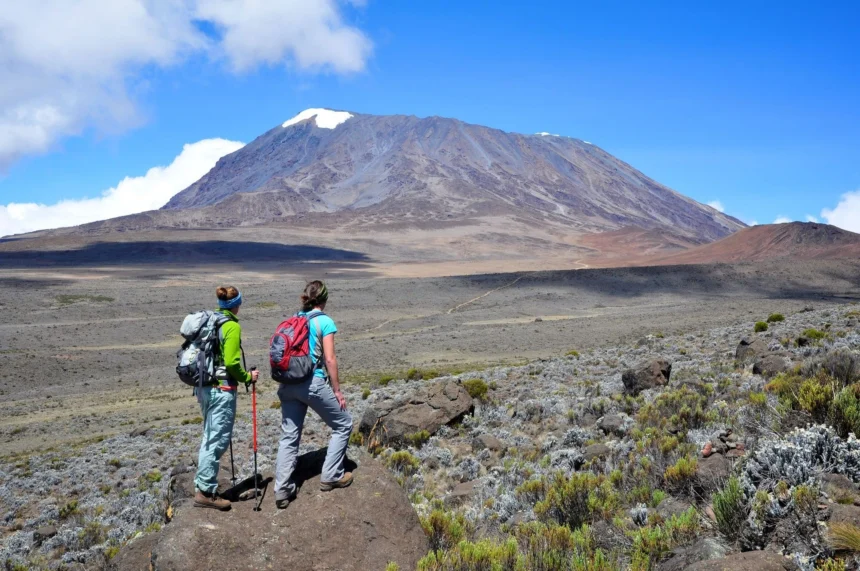Mount Kilimanjaro, Africa’s tallest peak, is a dream destination for trekkers worldwide. Rising majestically at 5,895 meters (19,341 feet), this dormant volcano offers an unparalleled adventure. Whether you’re an experienced hiker or a first-time climber, proper preparation and knowledge are crucial to making your journey a success. This comprehensive guide covers everything you need to know about conquering Kilimanjaro.
Understanding Kilimanjaro’s Climbing Routes
Kilimanjaro offers several routes to the summit, each with its own level of difficulty, scenery, and success rate. Choosing the right one is essential for an enjoyable experience.
Marangu Route
Known as the “Coca-Cola” route, the Marangu path is the only one that provides hut accommodations instead of tents. While it is one of the shorter routes, the quick ascent makes it more challenging due to limited acclimatization time.
Machame Route
The Machame, or “Whiskey” route, is among the most popular due to its stunning landscapes and higher success rate. Although it requires more endurance and skill, the longer acclimatization period increases the chances of reaching the summit.
Lemosho Route
For those seeking a scenic and less crowded trek, the Lemosho route is an excellent option. This route provides great acclimatization opportunities and a gradual climb, making it suitable for those who prefer a more immersive experience.
Rongai Route
The only route approaching Kilimanjaro from the north, Rongai, is drier and more remote. It offers a steady ascent and is ideal for climbers who wish to avoid the crowded southern routes.
Northern Circuit
As the longest and most scenic route, the Northern Circuit provides maximum acclimatization time, leading to one of the highest success rates. However, it requires more time on the mountain, typically 9 to 10 days.
Best Time to Climb Kilimanjaro
Although Kilimanjaro can be climbed year-round, the best periods are during the dry seasons: January to March and June to October. These months provide more stable weather conditions, making the trek safer and more enjoyable. The rainy seasons (April-May and November) can be challenging due to slippery trails and reduced visibility.
Physical Preparation and Fitness Requirements
Climbing Kilimanjaro is a demanding adventure that requires physical endurance and mental resilience. Preparing your body several months in advance can significantly improve your chances of reaching the summit.
Cardiovascular Training
Engaging in cardio exercises such as running, cycling, and swimming helps improve stamina. Since Kilimanjaro involves long hours of walking at high altitudes, endurance is crucial.
Strength Training
Strengthening your legs, core, and back will enhance stability and prevent injuries. Squats, lunges, and weight training are beneficial for building the necessary muscle endurance.
Altitude Acclimatization
Since altitude sickness is one of the main challenges of climbing Kilimanjaro, pre-acclimatization can help. If possible, consider hiking at high altitudes before your trip to get your body used to the reduced oxygen levels.
Packing Essentials for Your Kilimanjaro Expedition
Packing correctly for Kilimanjaro is vital for comfort and safety. Here are some must-have items:
Clothing and Footwear
- Layered clothing for temperature regulation
- Waterproof jacket and pants
- Insulated gloves and hat
- Sturdy hiking boots with ankle support
Equipment and Gear
- Trekking poles for stability
- Sleeping bag rated for extreme cold
- Headlamp with extra batteries
- Sunglasses and sunscreen for UV protection
Health and Safety Essentials
- First aid kit with altitude sickness medication
- High-energy snacks and hydration system
- Personal hygiene items and wet wipes
The Challenges of Climbing Kilimanjaro
Despite being a non-technical climb, Kilimanjaro presents unique challenges that trekkers must overcome.
Altitude Sickness
As you ascend, oxygen levels decrease, leading to altitude sickness symptoms like headaches, nausea, and dizziness. Taking the climb slowly, staying hydrated, and choosing a longer route can help with acclimatization.
Harsh Weather Conditions
Kilimanjaro has five ecological zones, ranging from tropical rainforests to arctic conditions at the summit. Proper gear and clothing will protect you from extreme cold, strong winds, and sudden weather changes.
Physical and Mental Endurance
The trek requires determination, as exhaustion and altitude effects can be overwhelming. A strong mindset and positive attitude are essential for pushing through the toughest sections.
What to Expect on Summit Day
Summit day is the most grueling part of the trek, starting at midnight to reach Uhuru Peak at sunrise. The final ascent is steep and cold, but the reward of standing atop Africa’s highest point makes every struggle worthwhile.
Cost of Climbing Kilimanjaro
The cost of a Kilimanjaro trek varies based on factors such as route, tour operator, and duration. On average, a guided trek costs between $2,000 and $5,000. Opting for a reputable operator ensures safety, experienced guides, and proper logistical support.
Conclusion: Is Kilimanjaro Worth It?
Climbing Kilimanjaro is a life-changing experience that tests your physical and mental limits while rewarding you with breathtaking views and an unparalleled sense of accomplishment. With the right preparation and mindset, anyone with determination can conquer this iconic peak. If you’re ready for an adventure of a lifetime, Kilimanjaro awaits!
